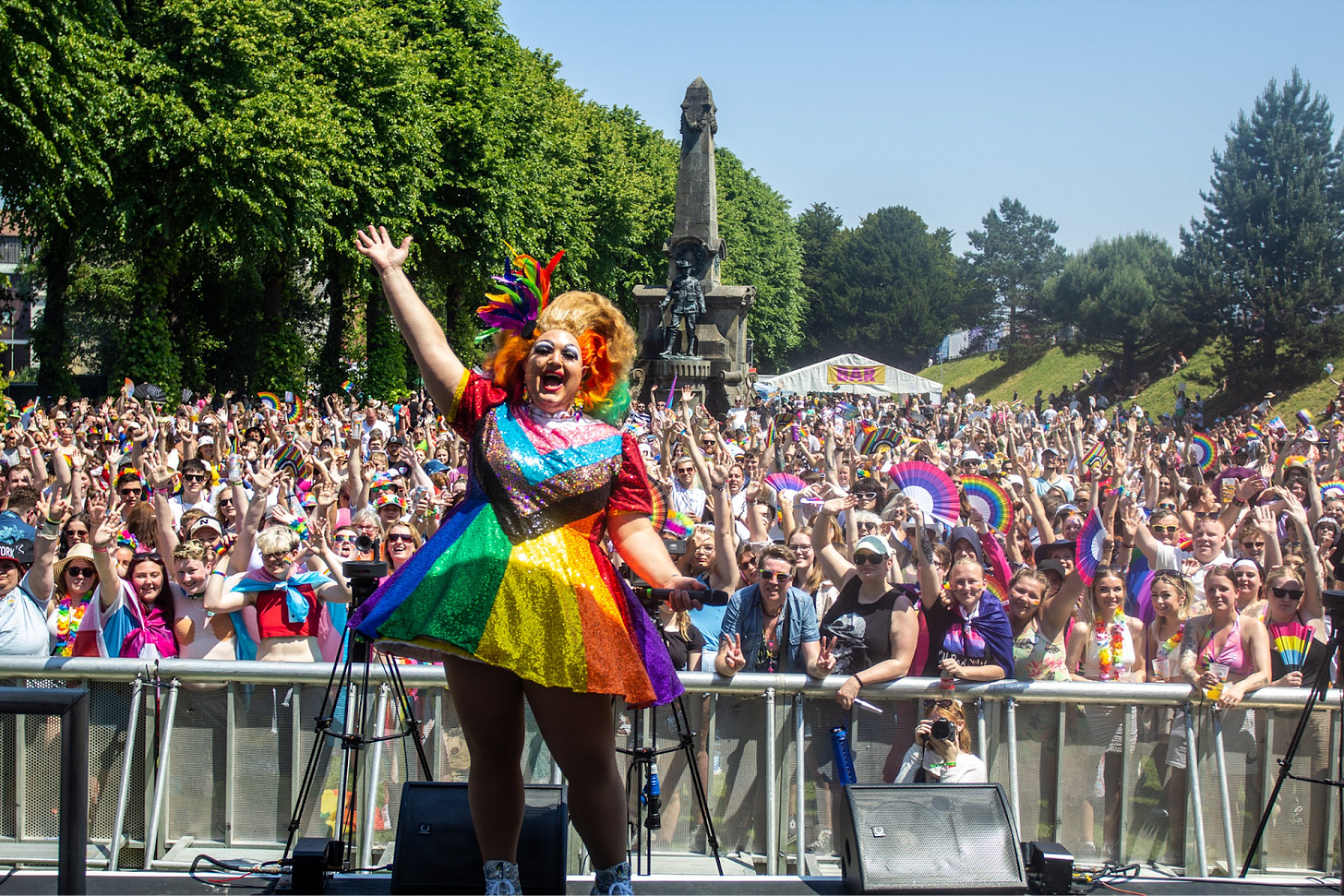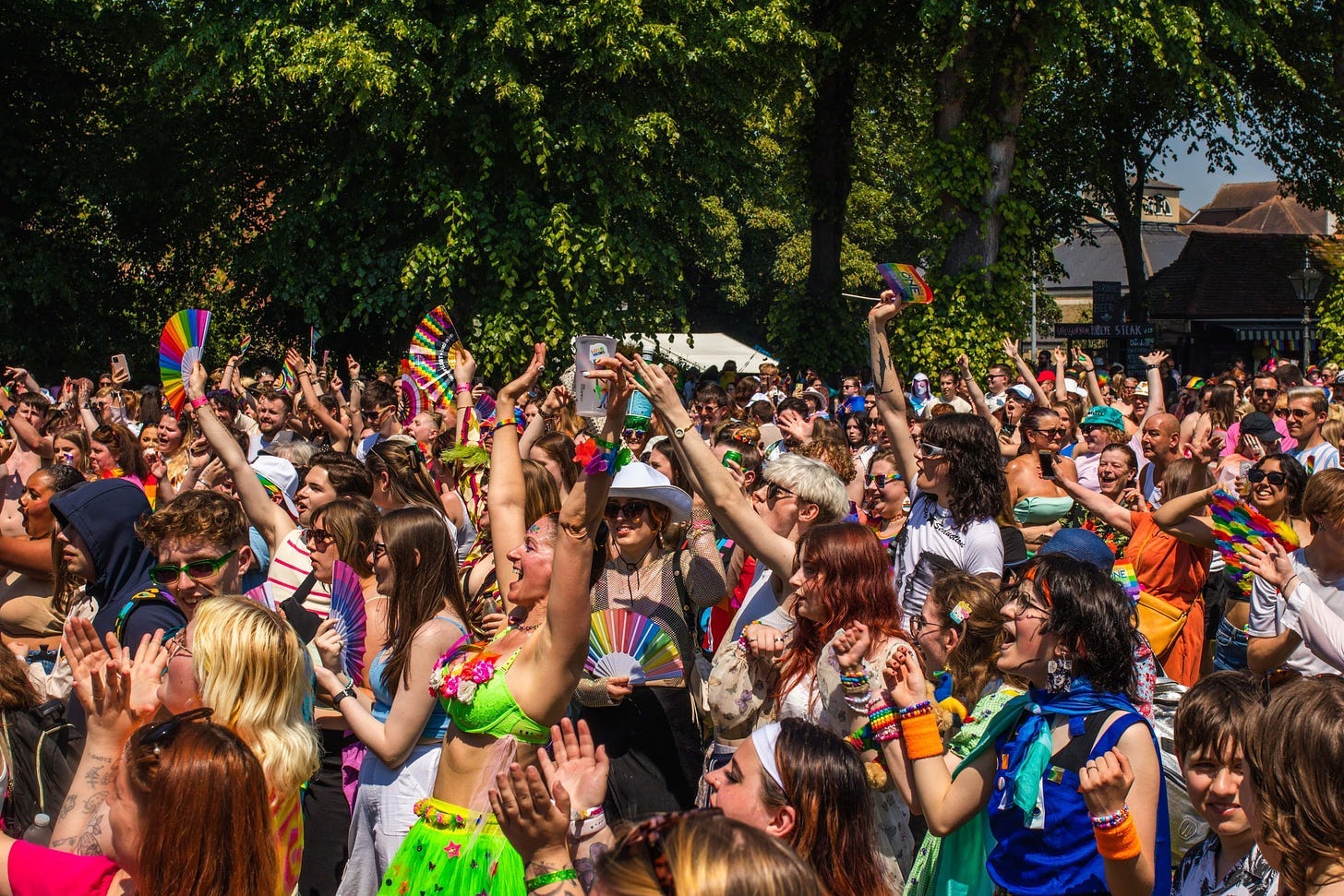Canterbury's Pride in the park
Around the world, countries celebrate LGBTQ+ pride during the month of June. In Canterbury, England, thousands take to the streets each year in celebration.
Editor’s note: This article was initially submitted on June 15, 2024 for NAU in the United Kingdom: Travel Journalism at Northern Arizona University.
Adorned in sparkling face paint, pride flags and rainbow-themed attire, thousands gathered in Canterbury on June 8 for the Canterbury Pride Festival and Parade.
The annual celebration took place in the Dane John Gardens and featured a variety of performances from drag queens and live musicians while attendees were invited to shop LGBTQ+ regalia from small business owners, enjoy international cuisine from a variety of food trucks and take photos in designated booths.
Performances were split between three stages and included notable sets by West End and Broadway professional Kerry Ellis, vocalist Sabrina Washington, singer Michelle McManus, TikTok star Charli Lee and RuPaul’s Drag Race UK contestants Black Peppa and Baga Chipz.
Local drag queen Dame Jame also made an appearance, covering “Seven Nation Army” by The White Stripes and “Sweet Dreams (Are Made of This)” by Eurythmics while dancing in 6-inch stilettos and a Princess Diana-themed dress. Elsewhere, the Oompa Loompa from the controversial Glasgow Willy Wonka Experience took photos with fans at a paid meet-and-greet.
18 year-old AJ, who has attended Canterbury Pride twice, said these performances are important reminders of why Pride is celebrated each year.
“Seeing everyone with the flags and the makeup and just being themselves is just so euphoric and it’s so joyful,” AJ said. “But it’s so important to remember that pride is a protest and it’s one of those ideas of ‘We’re all here because we know what it’s like to feel alone and discriminated against,’ and it’s nice to create this community through coming to events.”
This year’s Pride month falls just after Prime Minister Rishi Sunak said the Conservative Party plans to rewrite the 2010 Equality Act.
"The safety of women and girls is too important to allow the current confusion around definitions of sex and gender to persist," Sunak said.
Although the law already prohibits discrimination against protected characteristics such as disability, religion, race, sex and sexual orientation, an amendment would change the act’s language to specify “biological sex,” allowing single-sex locations to prohibit entry to transgender women.
As a first-time voter in the upcoming general election, AJ said they have been especially wary of misinformation on transgender healthcare and how it affects anti-LGBTQ+ laws that are passed or amended by parliament.
“I was listening to one of the news channels the other day and it was one of these nurses who used to work at a health clinic,” AJ said. “She was talking about how she found out that the doctors were being negligent and that they only did one meeting [with a patient] before starting them on hormone blockers. That’s not how it works. The amount of misinformation that is spread around as common knowledge like ‘Oh yes, many people regret their surgeries’ and ‘Oh yes, it’s very easy to get hormone blockers’ is terrifying.”
Despite such reports, a 2019 study on the detransition rates in a UK Gender Identity Clinic found that less than one percent of patients had expressed regret in their gender transition or had detransitioned. Additionally, less than 100 young people in England are currently prescribed puberty blockers by the National Health Service (NHS), which stated they will no longer be prescribing the hormone treatment as of 2024.
The United States has seen a similar rise in homophobic rhetoric as the Republican-majority government has taken measures to reduce legal protections for members of the LGBTQ+ community. Over 510 anti-LGBTQ+ bills were introduced in state legislatures in 2023, many of which focused on banning gender-affirming healthcare for transgender youth and regulating school curriculum to prevent discussion of gender identity and sexuality.
AJ said Pride is a guaranteed safe-space for attendees to feel accepted in the face of increasingly homophobic regulation.
“I feel like in every single LGBT person, there is this moment of sheer terror,” AJ said. “Even if we’re really lucky and we’ve got this amazing accepting family, there is this moment of sheer terror, of living in the society that we know we won’t conform to. I think that Pride especially is one of those places where it’s safe to come out and meet other people that you know support each other.”
Similarly, Archie has been attending Pride events in Canterbury and London for three years. He said attendees at Pride have always been incredibly kind, even when counter-protestors make an appearance at parades.
“Everyone here is lovely,” Archie said. “Everybody here looks so cool. I don’t think I’ve ever met someone at a pride festival or parade who isn’t nice. You might have the occasional ‘Bible basher’ who’s not a part of [the parade] but I’ve never met someone who’s actually rude or unkind … It’s just really nice.”
However, he mentioned that the recent rise in homophobia is especially concerning since Conservative leaders have been openly supportive of LGBTQ+ rights in the past.
In 2013, Prime Minister David Cameron pushed for the legalization of same-sex marriage which saw ratification in the same year. In 2018, Prime Minister Theresa May introduced the LGBT Action Plan to establish protections for members of the LGBTQ+ community, and called for a ban on gay and transgender conversion therapy. Last year, MP Elliot Colburn begged his fellow Conservative party members to stop demonizing transgender people the LGBTQ+ community,
Archie said Pride is a form of protest and that it is essential to providing a voice to the LGBTQ+ community members in the face of homophobia.
“The more visible [Pride] is, the harder it is to be openly cruel about it,” Archie said. “Bullying has been so normalized these days and because Generation Z is the current leading demographic, we have to push that this isn’t okay. In the past, there were people who couldn’t live their lives, so now we have to stand up and say ‘Well, you don’t want me to exist so the best revenge I can have is that I’m gonna be here and I’m gonna have a hell of a good time.”
Although Canterbury’s celebrations have now ended, Pride events will continue throughout the country through the end of the month. London will host their own Pride parade on June 29, with over one million people expected to attend.






